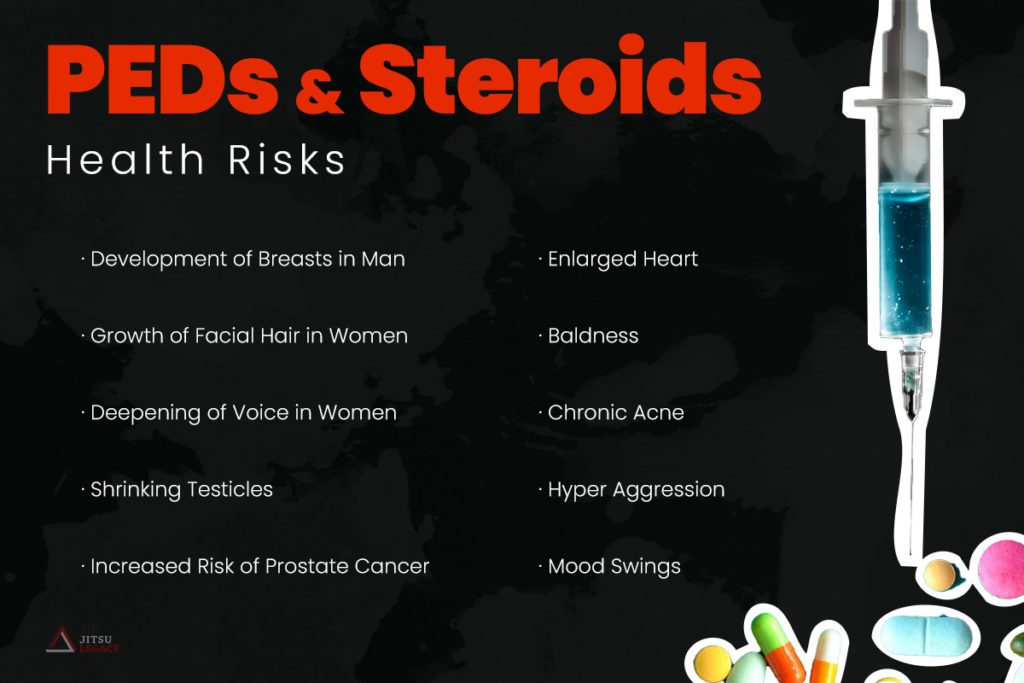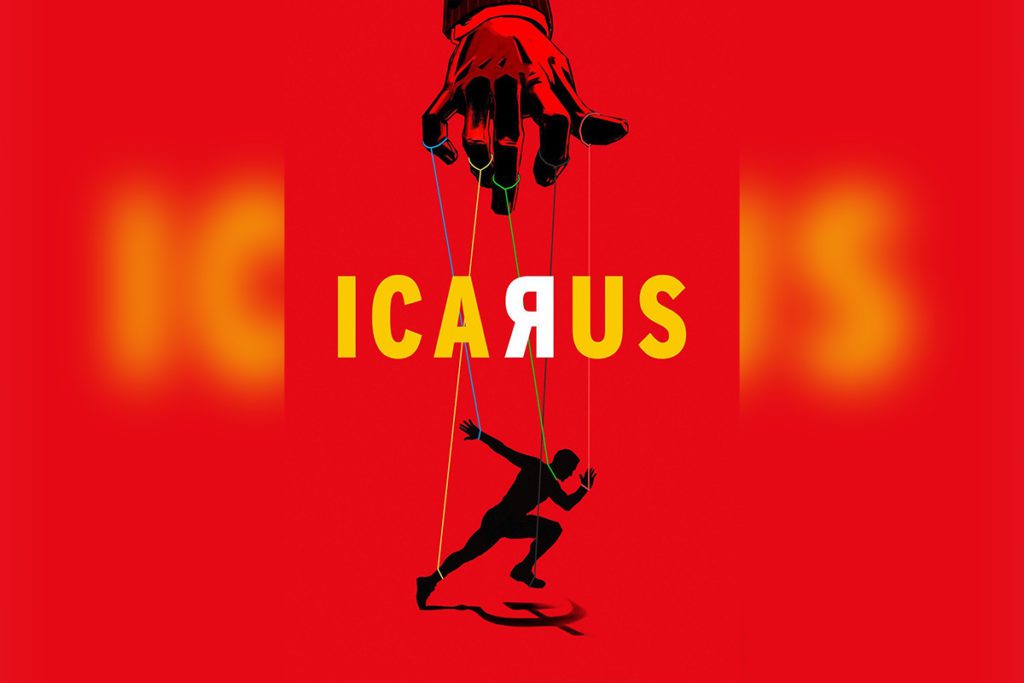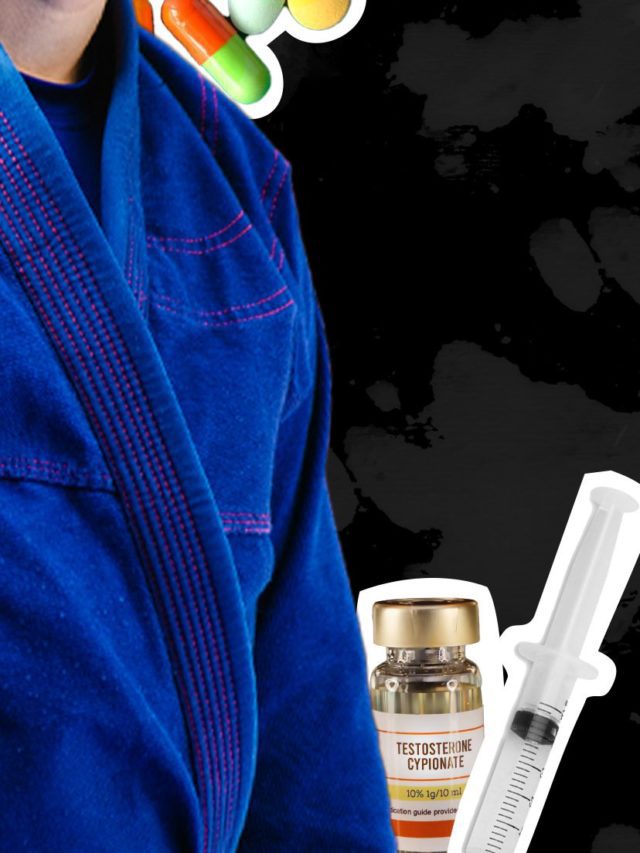The professional Jiu Jitsu world was recently rocked by the news that Felipe Pena had his world champion title stripped from him by the IBJJF for failing a drug test which revealed the substance Clomiphene in his system. Performance enhancing drugs have always been a hot topic in the world of professional sports and Pena is just the tip of the BJJ PED iceberg.
On June 14th, 2007 Royce Gracie tested positive for Nandrolone, a performance enhancing steroid after his famed rematch with the infamous Kazushi “Gracie Hunter” Sakuraba.
There are widespread rumors and allegations of many top BJJ athletes using steroids and PEDs, but how much truth is there to these claims? Should Jiu Jitsu even bother to test athletes? This article will answer all your questions on how steroids and PEDs fit into BJJ.
What are PEDs and Steroids?
PEDs stands for performance enhancing drugs. The term can cover a wide variety of hormones and chemicals which boost athletic performance. Two of the most common types of PED are testosterone (or chemicals like Clomiphene which boost testosterone production) and steroids. Both of these types of drugs tend to increase muscle mass and decrease recovery time.
PEDs might be the largest cause of professional sports scandals. You hear about professional athletes from every sport failing drug tests, from college level athletes to Olympic medalists. Professional Jiu Jitsu and MMA are no exception to this.
What’s the Big Deal with Using PEDs?
You might be surprised to learn it’s actually illegal to take most PEDs without a prescription, regardless of whether or not you are a professional athlete. Most steroids today are sold on the black market and the dark web.
Professional sports competition organizations usually have explicit rules against using PEDs, most often deferring to the World Anti-Doping Association (WADA) or regional equivalents such as the US Anti-Doping Association (USADA). For amateur level competition, PEDs are rarely specifically prohibited in the rules.
One reason many sports seek to eliminate the usage of PEDs is that overuse can have many negative effects on your health. According to the National Institute on Drug Abuse, steroids are detrimental to long term health, impacting both physical health and mental health.

Potential Physical Health Problems from PEDS:
In men, overuse of steroids can cause the development of breasts, baldness, shrinking testicles, and an increased risk of prostate cancer. To make matters worse they can also cause your heart to become enlarged; which can lead to potentially life-threatening cardiac problems later in life. Although they may tone your muscles, they take a serious toll on the rest of your body.
In women, PEDS can cause the development of masculine features such as a deepening of voice, loss of hair, breast shrinkage, and growth of facial hair. PEDS can also cause enlarged hearts and the same cardiac problems they cause in men.
On top of both of these side effects, steroids and PEDS are known to cause chronic acne in people who use them frequently.
Potential Mental Health Defects from PEDs:
It’s known that PEDS can have a dramatic effect on your mental health as well as your physical health. You might be familiar with the term “roid rage.” It actually comes from the hyper aggression people experience during and after taking some types of PEDS. On top of being aggressive, people on PEDS might also have mood swings and become irritable easily.
Arguments for PEDs in Sports
You might be surprised that despite the health effects listed above there are many advocates for PEDs who believe sports agencies shouldn’t do any testing at all. They believe that PED usage is so widespread that it makes more sense to have agencies like the FDA regulate their use to help make them safer.
Another pro-PED argument is that we could have open divisions for PED usage, where athletes could push themselves to the absolute limit. Finally in addition to helping build strength, PEDs can actually help prevent injury, and help athletes recover faster.
A Short History of Steroids in Sports
In 1990 the US Congress passed H.R. 4658, better known as the Anabolic Steroids Control Act of 1990. The most interesting thing about the law is that it didn’t just punish athletes who were using steroids, but it also punished coaches and trainers who offered/persuaded athletes to use steroids.
The law also has different degrees of punishment depending on whether coaches pushed PEDs on people who were under the age of 18. If coaches offered steroids to people over the age of 18, they can get a maximum of two years in prison. If the athlete is under the age of 18, the maximum prison sentence is five years.
The Icarus Documentary
You might have heard of the famous 2017 documentary, Icarus. This documentary exposed the entire Russian Olympic team in almost every sport (except Ice Skating) for illegal doping. The International Olympic Committee (IOC) decided to ban Russia from competing in the following Olympic Games.
The documentary also heavily implies that the Russian government helped the athletes obtain steroids and actively tried to silence people and scientists who spoke out.
Although Russia was banned from the Winter Olympics from 2018-2022, many of the athletes were still allowed to compete under a different banner called the ROC. (Russian Olympic Committee.) As you can imagine this sparked outrage from many other athletes in the Olympics, who say allowing athletes to compete anyway mitigates the punishment.
Steroids in the UFC
It’s easy for people to forget that the early days of the UFC were plagued with steroid use. Both Royce Gracie and Ken Shamrock tested positive at some point in their careers.
However recently the UFC has started to close the loopholes in its testing policies. In 2017 the UFC changed its policy from testing fighters every four months to testing fighters randomly once a month.
Fighters are not allowed to refuse a drug test and receive a suspension from the UFC if they test positive. The USADA, which manages all the drug tests for the UFC, not only collects urine samples but blood samples too. This is because they don’t only test for steroids, but also for bloodborne pathogens like HIV and Hepatitis.
Steroids in Professional Jiu Jitsu

Currently, the IBJJF is the only organization known to test athletes for steroids. However, they don’t test lower-level athletes at their minor/regional tournaments. Their high-level black belt competitions are a different story though. Just like the UFC, these athletes are subject to random testing by the USDA.
Ironically, although the IBJJF is the organization that will suspend an athlete who tests positive for PED usage; the first news of an athlete testing positive is actually published on the USADA Website.
What’s notable about Felipe Pena’s recent positive test for PEDs is that this is actually the second time he has tested positive for PEDs. It’s hard to say exactly what his being caught again has to say about the state of PEDs in the sport… but it’s clear that anyone who says PEDs aren’t being used in BJJ is simply not paying attention.
Can We Expect Jiu Jitsu to Take the Same Route as MMA?
The stakes in combat sports are much higher than in non-combat sports. Although no one has died in the octagon, there have been numerous deaths in MMA bouts. A good argument against PED usage is that a level playing field could mean life or death in a mixed martial arts ring.
Over time, the UFC seems to be testing athletes more and more for this reason. Many UFC superstars like Jon Jones have tested positive on tests. Other major sporting organizations like the MLB have historically been getting a tighter grip on athletes who used steroids, like Barry Bonds and Mark McGuire.
As widespread as PED usage probably is in professional sports; based on historic trends its likely Jiu Jitsu will also slowly start to implement more regulations and tests against PEDs.
Conclusion
Brazilian Jiu Jitsu doesn’t put athletes through the same drug testing rigor that the UFC does, however, it looks like the overall trend is for sports organizations to slowly tighten their chokehold around PEDs and their usage.
Ultimately, it is important for BJJ practitioners to understand that PEDs carry significant health risks and that for the overwhelming majority of us, the benefits don’t outweigh the risks. For the highest level of competitors… well, for now it seems that only the IBJJF is paying attention, but as time goes on we expect that to change.

Jack is a D who holds a bachelors degree in English Literature. He enjoys traveling, reading, and the Bow and Arrow choke. One day he hopes to teach English overseas and become a published author.



Hello! Someone in my Facebook group shared this website with us so I came to check it out. I’m definitely enjoying the information. I’m book-marking and will be tweeting this to my followers! Outstanding blog and outstanding design.